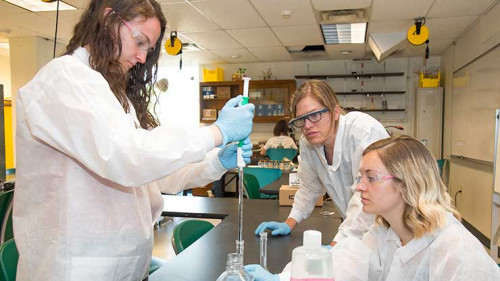
He’s a Pulitzer Prize winning author of fiction who began his writing career on the Siena College student newspaper.
Willian Kennedy ’49 made an informal stop on campus October 30. He was accompanying his son Brendan, who was part of the advance team for a business lecture by financial planner Tom Curran.
Coincidentally, this week was the 40th anniversary of the publication of Ironweed, the novel that won him not only the Pulitzer in 1984 but the National Book Critics Circle Award and a spot on the Modern Library’s ranking of 100 best English language novels. Set in Depression-era Albany, the novel tells the story of Francis Phelan, who left his family after accidentally killing his infant son.
Kennedy, 95, met with a small group in the Molinari Room to reminisce about his days as a Siena student, and to talk about his craft as a writer of fiction, non-fiction, screenplays, criticism and more. His latest project? The day before his campus visit he had been up until 1AM putting the finishing touches on a screenplay for a man he referred to simply as “Francis,” who was actually the famed director Francis Ford Coppola. The two are collaborating on a production of Kennedy’s novel Legs, about the gangster Jack “Legs” Diamond.
But long before he breathed life into Francis Phelan, Legs Diamond and other characters in his Albany Cycle novels, Kennedy was a cub reporter for the Siena paper, known then as The Indian. Now called The Promethean, the Siena paper is co-edited by Asavari Gowda ’25 and Hussein Fayad ’24, who presented Kennedy with their most recent edition.
“I felt very honored to meet Mr. Kennedy and learn about his life and career,” said Gowda. I was inspired not just by his many accomplishments, but also by the fact that he still stays up until 1AM writing scripts. His passion for his craft is very apparent and the fact that it has not changed since his time at Siena writing for the student newspaper is wonderful.”
Fayad, noting that Kennedy’s journey as a writer and editor began at the paper where he and Gowda now work, called him “a testament to the limitless possibilities for aspiring writers.”
“It’s a privilege for all Siena students to know that a Pulitzer Prize-winning career can have beginnings right at the heart of our campus. It’s an inspiration for all students on the path of literary excellence.”
During his visit, Kennedy was presented with a black Siena zip jacket by President Chuck Seifert, along with an alumni lapel pin.
He shared stories of some of the first friars at Siena: Fr. Ben Kuhn, O.F.M., (“a Friar Tuck figure”) who used to lead a pet duck around by a leash; and Fr. Brendan Lynch, O.F.M., who once illustrated the concept of infinity to his mathematics class by drawing a long line on the chalk board, which he continued out of the classroom and down the hall. Two days later, he returned for the next class session by walking into the room drawing the same line.
Kennedy said he had always wanted to be “a newspaperman,” and made sure he would have the opportunity to write for the campus paper before accepting admission to Siena.
“I was very insistent about that,” he said. “I told them if I can’t be on the paper, I don’t want to come to school here.”
Kennedy did jump right into student journalism when he enrolled, and was also a stringer for the Albany Times Union during his Siena years. He reminisced about campus “smokers,” where the young men would gather to puff on cigarettes, watch a movie and talk sports. He wrote about them for the school paper, and said his fledging efforts at writing were “terrible.”
He credited English professor Fr. Matthew Conlin, O.F.M., for helping him to up his writing game.
“He had the grace to do some rewrites so my articles were presentable,” Kennedy explained. “We never really spoke of it, but I knew he did it and it was the sign of a good working relationship. He was a very astute critic and we were great pals.”
He also noted that his Siena classes in Latin strengthened the foundation of his writing.
“Latin gave me a deep appreciation for language that I simply wouldn’t have had otherwise,” he said. “It was a wonderful addition to my education here.”
He said as he learned more about newspaper writing he became “monomaniacal” about improving his writing and reading the work of the great columnists of the day such as Heywood Broun, Red Smith and Damon Runyon.
“I wanted to be them, plain and simple.”
In addition to journalistic writing, Kennedy also tried his hand a writing short stories, which he said were “very imitative of other writers of the day.” He went on to develop his own inimitable style; his days as a reporter and editor (he founded two newspapers in Puerto Rico) morphed in his 50s into a life as a novelist and critic, and later a playwright and screenwriter. He penned the screenplay for the 1987 film adaptation of “Ironweed,” in which he had a cameo – plus an onscreen smooch from star Meryl Streep.
His current project – the “Legs” screenplay for Coppola – is keeping him busy. The two are seeking a producer. He’s hoping the script will stay put; the pair collaborated on the 1984 film “The Cotton Club,” which went through 40 rewrites to keep the producers and stars happy.
For current Saints who are looking to pursue writing as a career, he offers this advice:
“Journalism is a game of wit. All the columnists that I really valued had an element of wit in them. Writing doesn’t always have to be so prim and serious. It perhaps isn’t essential, but I think if wit is present in your writing it can help you move out of the mainstream and really stand out as a writer.”

